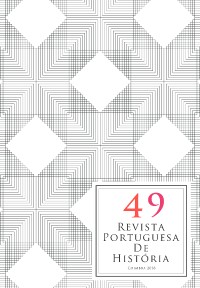Please use this identifier to cite or link to this item:
https://hdl.handle.net/10316.2/44883| Title: | Transcrições em linha: e‑learning de Paleografia em arquivos europeus | Other Titles: | On‑line transcriptions: Palaeography e‑learning in European archives | Authors: | Borges, Leonor Calvão Silva, Ana Margarida Dias da |
Keywords: | Transcriptions;Public archives;History of writing;Transcrições;Arquivos públicos;História da Escrita | Issue Date: | 2018 | Publisher: | Imprensa da Universidade de Coimbra | Abstract: | A paleografia, ciência que, na sua vertente
prática, se dedica ao ensino da leitura de
manuscritos antigos, independentemente da
sua língua, esteve tradicionalmente associada
aos cursos de História e Ciências Documentais,
confinada aos bancos académicos, e vista como
ciência auxiliar. É no âmbito dos projetos de
crowdsourcing de transcrições documentais
que vemos surgir manuais e cursos de
paleografia on‑line.
O presente trabalho
procura identificar a oferta formativa on‑line
de cursos de paleografia medieval e moderna,
em particular promovida por arquivos locais
e regionais portugueses, espanhóis, ingleses
e franceses associados a esses projetos.
Pretende‑se
entender como a paleografia de leitura é desenvolvida pelos arquivos, perceber
que normas são utilizadas, quem faz manuais
de transcrição, a que grupo se dirigem em
particular, que tipologias documentais são
mais disponibilizadas, periodicidade do curso /
disponibilização das imagens para transcrição,
e, por fim, perceber o que acontece com as
transcrições. Conclui‑se
com uma análise
sobre a contribuição destes projetos para o
desenvolvimento da paleografia de leitura, e,
de uma forma mais genérica, para a história
da cultura gráfica. Palaeography, a science that, in its practical aspect, is devoted to the teaching of reading ancient manuscripts, regardless of their language, has traditionally been associated with the courses of History and Archival Sciences, confined to academic banks, and seen as auxiliary science. It is within the scope of the crowdsourcing projects of documentary transcriptions that we see arise manuals and courses of online palaeography. The present work seeks to identify the online formative offer of medieval and modern palaeography courses, namely those promoted by the Portuguese, Spanish, English and French local and regional archives associated with these projects. It is intended to understand how the reading palaeography is developed by the archives, to understand which norms are used, who makes transcription manuals, to which interests group are they directed, which typologies are more available, periodicity of the courses / provision of the images for transcriptions, and, finally, realize what happens to the transcripts. It concludes with an analysis of the contribution of these projects to the development of reading palaeography, and, more generally, to the history of graphic culture. |
URI: | https://hdl.handle.net/10316.2/44883 | ISSN: | 0870-4147 2183-3796 (digital) |
DOI: | 10.14195/0870-4147_49_2 | Rights: | open access |
| Appears in Collections: | Revista Portuguesa de História |
Files in This Item:
| File | Description | Size | Format | |
|---|---|---|---|---|
| artigo2_rph_49.pdf | 530.96 kB | Adobe PDF |  |
Items in DSpace are protected by copyright, with all rights reserved, unless otherwise indicated.
